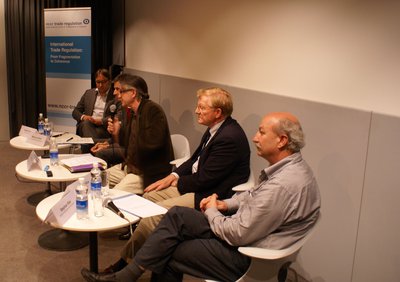20 May 2013
Extracting and Trading Copper: A Swiss Company’s Practices under Scrutiny
Company taxation, the disputed role of transfer pricing within the extractive industry and related aspects of development are the central topics of the film "Stealing Africa". In a recent event at a local Bernese cinema, panellists from the press, from academia and from the public administration debated about how to regulate this sector.
For the third event of their “Film & Discussion” series, the World Trade Institute (WTI) and the NCCR Trade Regulation, organised a screening of the film Stealing Africa, together with the Centre for Development and Environment (CDE) and foraus – Forum Aussenpolitik. More than one hundred people arrived at the Kino Kunstmuseum in Berne on 8 May 2013 to learn more about company taxation and transfer pricing within the extractive industry and issues related to economic development in Zambia.
The film was of particular relevance to the Swiss audience, because it is based on a case study of the Mopani Copper mines, which are owned by Glencore – a company with its global headquarters in Baar, Switzerland. Stealing Africa addresses the question of how a country like Zambia that is so rich with natural resources could remain one of the poorest countries in the world. Among other things, the film argues, the lack of transparent business practices and loose tax legislation enabled Glencore to shift corporate profits, which resulted in a withdrawal of large amounts of Zambian tax revenues.
The SRF (the public broadcaster for German-speaking Switzerland) declined to purchase the series. Yet, 69 television stations world-wide showed the film, including RTS, a broadcaster in the French-speaking part of Switzerland.
Journalist Beat Glur chaired a lively discussion following the film with four key panellists. Gerald Hosp, Editor, Neue Zuercher Zeitung, called for specific transparency laws that address and differentiate between the mining companies and the trader of extractives. For the former, the US Federal Dodd-Frank Act prescribes the disclosure of payments to foreign governments. On a global scale, the voluntary Extractive Industries Transparency Initiative (EITI) takes a similar route.
Stephan Rist, Associate Director, CDE, elaborated on the idea of transparency, stating that the problem is far greater than was depicted in the documentary. He urged policy-makers to focus less on specific cases, but rather to concentrate on gaps in the international trading system. WTI Managing Director, Thomas Cottier emphasised that companies must be held responsible for their subsidiaries, which is not yet the case in Switzerland. Drawing on the example of mobile phones, he stated that no one knows where the copper parts come from and how they were extracted. As a solution, Cottier called for a labelling of raw materials.
Markus Leitner, Deputy Head, Federal Department of Foreign Affairs, Human Security Division highlighted the importance of corporate codes of conduct, something that the Swiss government implemented successfully in other cases. Leitner explained that the recently published report on commodities by the Federal Council is a first step that could lead to the creation of codes of conduct in the extractive industry.





